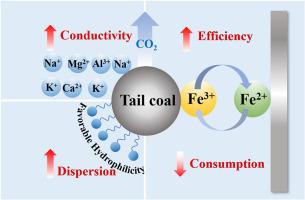利用浮选尾煤加强水电解制氢的机理研究
IF 8.1
2区 工程技术
Q1 CHEMISTRY, PHYSICAL
引用次数: 0
摘要
煤助水电解制氢(CAWE)是一种很有前途的高效利用煤炭资源和可持续生产氢气的方法。然而,确定一种具有成本效益和效率的碳源仍然是一项关键和持续的挑战。本研究提出利用浮选尾煤作为一种新型高效的电解水碳源。本研究通过电化学实验、热力学分析和综合材料表征技术相结合,探讨了尾煤辅助水电解制氢(TCAWE)在提高制氢效率方面的有效性。研究发现,矿物,特别是铁和锰离子的催化作用,在CAWE工艺中显著降低了能耗,增强了阳极氧化反应。与传统煤源相比,浮选尾煤具有较高的催化矿物含量和良好的亲水表面性能,不仅降低了电解电压,而且提高了产氢率。本研究创新性地证明了在水电解中利用浮选尾煤具有双重效益:它提供了一个具有成本效益的、丰富的碳源,同时促进了一个更高效和可持续的制氢过程。此外,该方法有望促进废浮选尾煤的资源化利用。本文章由计算机程序翻译,如有差异,请以英文原文为准。

Mechanistic insights into the use of flotation tail coal for enhanced water electrolysis in hydrogen production
Coal-assisted water electrolysis for hydrogen production (CAWE) is a promising method for the efficient utilization of coal resources and the sustainable generation of hydrogen. However, identifying a cost-effective and efficient carbon source remains a critical and ongoing challenge. This study proposes the use of flotation tail coal as a novel and efficient carbon source for water electrolysis. Through a combination of electrochemical experiments, thermodynamic analysis, and comprehensive material characterization techniques, this research explores the effectiveness of tail coal-assisted water electrolysis for hydrogen production (TCAWE) in enhancing hydrogen production efficiency. It is found that the catalytic effect of minerals, particularly iron and manganese ions, is instrumental in significantly reducing energy consumption and enhancing the anodic oxidation reactions in the CAWE process. Flotation tail coal, with its high content of these catalytic minerals and favorable hydrophilic surface properties, not only lowers the electrolysis voltage but also increases the hydrogen yield compared to traditional coal sources. This research innovatively demonstrates that utilizing flotation tail coal in water electrolysis offers a dual benefit: it provides a cost-effective, abundant carbon source while promoting a more efficient and sustainable hydrogen production process. Additionally, this approach is expected to facilitate the resource utilization of waste flotation tail coal.
求助全文
通过发布文献求助,成功后即可免费获取论文全文。
去求助
来源期刊

International Journal of Hydrogen Energy
工程技术-环境科学
CiteScore
13.50
自引率
25.00%
发文量
3502
审稿时长
60 days
期刊介绍:
The objective of the International Journal of Hydrogen Energy is to facilitate the exchange of new ideas, technological advancements, and research findings in the field of Hydrogen Energy among scientists and engineers worldwide. This journal showcases original research, both analytical and experimental, covering various aspects of Hydrogen Energy. These include production, storage, transmission, utilization, enabling technologies, environmental impact, economic considerations, and global perspectives on hydrogen and its carriers such as NH3, CH4, alcohols, etc.
The utilization aspect encompasses various methods such as thermochemical (combustion), photochemical, electrochemical (fuel cells), and nuclear conversion of hydrogen, hydrogen isotopes, and hydrogen carriers into thermal, mechanical, and electrical energies. The applications of these energies can be found in transportation (including aerospace), industrial, commercial, and residential sectors.
 求助内容:
求助内容: 应助结果提醒方式:
应助结果提醒方式:


